|
|
|
Sort Order |
|
|
|
Items / Page
|
|
|
|
|
|
|
| Srl | Item |
| 1 |
ID:
183851


|
|
|
|
|
| Summary/Abstract |
Brexit represents a unique process of European disintegration. It has introduced a new model of external differentiation that is likely to have future implications for existing differentiation both within the EU and between the EU and third countries. An analysis of the new thin, distant and unfinished EU-UK relationship points to likely growing divergence over time. The technocratic governance structure of the Trade and Cooperation Agreement (TCA) is strained by high-friction politics, and its effectiveness, sustainability and legitimacy remain highly contested. The TCA is a testament to a more hard-line EU approach towards third countries, attempting to signal strongly that membership matters, with flexibilities only benefitting those that sign up to the EU’s core principles.
|
|
|
|
|
|
|
|
|
|
|
|
|
|
|
|
| 2 |
ID:
190064
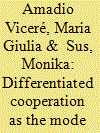

|
|
|
|
|
| Summary/Abstract |
While the standard conceptualization of differentiation in the European Union (EU) focuses on differentiated integration, scholars devote less attention to differentiated cooperation. This article argues, on the contrary, that member states’ engagement in differentiated efforts in EU foreign policy manifest themselves both in the form of differentiated integration and cooperation. It elaborates an original conceptual framework for exploring differentiated cooperation as a mode of governance. Drawing on the articles in this special issue, this introduction maps empirical manifestations of differentiated cooperation in various areas and dimensions of EU foreign policy. The results of the special issue show that differentiated cooperation has mostly manifested itself in informal patterns of cooperation, with the treaty-based mechanisms being limited. As such, the special issue reflects the differentiation and informalization processes occurring not only in the EU, but also in global governance more broadly.
|
|
|
|
|
|
|
|
|
|
|
|
|
|
|
|
| 3 |
ID:
171945


|
|
|
|
|
| Summary/Abstract |
With high interdependence, politicization, and unlikely enlargement, alternative options for EU–Turkey relations beg for consideration. This article argues that, first of all, conceptualization of a new model of EU–Turkey relations must thoroughly account for the evolution of the European project away from uniformity and towards more differentiation as a result of both integration and disintegration pressures. Secondly, an extended model of external differentiated integration has a potential to foster new, more dynamic EU–Turkey relations. However, its practical implementation is constrained by a number of challenges and scope conditions related to preferences and interests of key actors, namely EU institutions, member states and Turkey.
|
|
|
|
|
|
|
|
|
|
|
|
|
|
|
|
| 4 |
ID:
187306
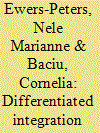

|
|
|
|
|
| Summary/Abstract |
An extensive size of literature has investigated the multifaceted dimensions of differentiated integration in Europe. Notwithstanding, we know little about the drivers and strategic underpinnings of differentiated integration in the high politics areas concerning national and international security, such as foreign policy, security and defence. What explains the variation in states’ foreign policy preferences of integration in multilateral security orders? In this article, we seek to explain this variation by putting forward a two-level argument. First, we claim that states adopt a genuine role player conception underpinned by a mixture of relative gains, absolute gains, and normative factors. Second, we propose a novel operational model to examine member states’ efforts for cooperation and integration in the security and defence domain based on their threat perceptions, level of ambitions, strategic partnerships, military spending, and troop deployments. To illustrate our argument, we employ a comparative case study design, examining four countries: Germany, France, Ireland and Romania. The article finds that the analysed countries play conspicuous roles in the Euro-Atlantic security order. France takes the role of an agile power-projector, Germany embraces the role of a global responsibility taker, Ireland plays the role of a peacekeeping neutral, and Romania of a small regional power.
|
|
|
|
|
|
|
|
|
|
|
|
|
|
|
|
| 5 |
ID:
183850
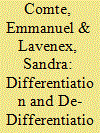

|
|
|
|
|
| Summary/Abstract |
The leading policy objective in EU differentiation underlying border controls, asylum and police cooperation has been to achieve the abolition of internal border controls to create a borderless European single market. Germany has been the main proponent kickstarting and maintaining this agenda through differentiation. For roughly two decades, differentiation has proved effective in abolishing internal border controls, integrating the related cooperation into EU structures, enlisting the cooperation of non-EU member states and producing joint policy outputs on asylum, external borders and police affairs. Yet, growing external migration challenges have undermined the effectiveness and legitimacy of existing arrangements, ushering in disintegration tendencies.
|
|
|
|
|
|
|
|
|
|
|
|
|
|
|
|
| 6 |
ID:
183852
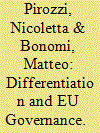

|
|
|
|
|
| Summary/Abstract |
Existing literature on differentiated integration has made an important contribution in theorising and operationalising its regulatory dimension. However, in order to fully evaluate the impact of differentiation on EU governance, this approach needs to be enriched with additional elements. The organisational element allows us to grasp the different forms, venues and actors of differentiation. The constitutional element connects the different forms of differentiation to the foundations of EU constitutionalism and identity. The socio-political element goes beyond the analysis of differentiation as a policy practice and qualifies it as a policy choice. On this basis, a generalisation is proposed resulting from a comparative analysis of a wide range of contributions in different policy sectors in order to assess differentiation in the EU’s governance against three main criteria: effectiveness, sustainability and accountability/legitimacy.
|
|
|
|
|
|
|
|
|
|
|
|
|
|
|
|
| 7 |
ID:
120833
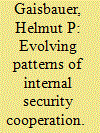

|
|
|
|
|
| Publication |
2013.
|
| Summary/Abstract |
This article discusses evolving patterns of internal security cooperation that start in the realm of international public law and end up more or less entirely in the treaty framework of the European Union. By applying the theory of clubs (Buchanan) it shows the fertility as well as limitations of a public goods approach to analyse and explain such instances of differentiated integration and to assess their effectiveness. By way of the comparative analysis of the Schengen regime and the Prüm Treaty it analyses five main stages of an internal security club's life circle from the causing obstacle (blocking of a certain policy) to the final incorporation endgame. Both clubs under investigation produced so-called network goods with negative rivalry logic, i.e. the more members participate and 'consume' the good the higher the benefit for all. However, it is also shown that club formation and expansion could not only be understood as a strategically rational process, and that various contextual costs inhibited the formation and eventual expansion of the clubs. The article concludes that incorporation efforts necessarily lead to pick-and-choose situations that preclude full uniformity; consequently, outside treaty clubs tend to create á la carte fragmentation to a certain degree.
|
|
|
|
|
|
|
|
|
|
|
|
|
|
|
|
| 8 |
ID:
184174
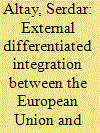

|
|
|
|
|
| Summary/Abstract |
The forthcoming Customs Union (CU) upgrade negotiations have the potential to stabilize and deepen the ties between the European Union (EU) and Turkey and bring them to a stronger form of external differentiated integration. This article examines the viability of an EU–Turkey Deep and Comprehensive Free Trade Agreement (DCFTA), similar to that between Ukraine and the EU, as an alternative to the CU. The paper contends that a DCFTA would benefit both the EU and Turkey while it would de facto shift the contractual relations from accession conditionality to market access conditionality with potential political repercussions.
|
|
|
|
|
|
|
|
|
|
|
|
|
|
|
|
| 9 |
ID:
172115


|
|
|
|
|
| Summary/Abstract |
The European Union (EU)-Turkey customs union (CU) has led to a significant level of integration between a non-member country and the EU and therefore represents an example of external differentiated integration. Turkey’s relations with the EU, until recently, have been largely motivated by its membership objective. However, Turkey’s membership prospects have recently been diminishing, due both to mutual estrangement because of Turkey’s ever-deteriorating performance on EU-mandated reforms and the current difficulties challenging European integration. Under these circumstances, concerns regarding structural problems and conjunctural challenges have forced both parties to revise the CU. This study aims to explain how the parties should revise it to tackle the challenges posed by current economic relations. It argues that building broader and deeper economic integration with a certain degree of collective policy-making capacity will be crucial for furthering relations, which may thereby contribute to Turkey’s accession process in a longer term.
|
|
|
|
|
|
|
|
|
|
|
|
|
|
|
|
| 10 |
ID:
183845


|
|
|
|
|
| Summary/Abstract |
The mounting phenomenon of differentiated integration in the EU has hitherto been studied mainly with regard to its drivers and legal configuration. Taking the existence of differentiated integration as a given, a conceptual framework is developed for analysing its governance in practice and the conditions under which this is effective and legitimate. Referring to examples from monetary integration and Justice and Home Affairs, the framework emphasises the interplay between the legal and organisational dimensions of differentiated integration, between commitment to common policies and opportunities for participation in their development and implementation. This includes measures for assessing and conditions for explaining the effectiveness and legitimacy of differentiated integration.
|
|
|
|
|
|
|
|
|
|
|
|
|
|
|
|
| 11 |
ID:
183843


|
|
|
|
|
| Summary/Abstract |
We present here the key theoretical underpinnings and general approach of the Special Issue “Governing Differentiation and Integration in the European Union: Patterns, Effectiveness and Legitimacy”, which collects contributions of a group of experts and scholars from the Horizon 2020 EU IDEA – Integration and Differentiation for Effectiveness and Accountability project. The key concepts for the analysis are clarified, namely differentiation, differentiated integration, effectiveness, legitimacy and sustainability. The basic claim of the Special Issue is that differentiation is not only necessary to address current challenges more effectively by making the Union more resilient and responsive to citizens. By introducing a useful degree of flexibility in the complex EU machinery, differentiation is also desirable, so long as such flexibility is compatible with the core principles of EU constitutionalism and identity, sustainable in terms of governance and acceptable to EU citizens, member states and affected third partners.
|
|
|
|
|
|
|
|
|
|
|
|
|
|
|
|
| 12 |
ID:
129972


|
|
|
|
|
| Publication |
2014.
|
| Summary/Abstract |
In the post-Lisbon era and especially since the outburst of the financial and European sovereign debt crisis, the EU has been changing significantly, to the extent that the meaning and the process of integration are being affected. While constitutional asymmetry is a longstanding feature of the EU polity, the real challenge today is the expanding scope and fragmented character of newly established forms of flexibility, and how they are being used politically. The flexible configuration of integration reinforces a trend toward fragmented integration. Flexibility within the EU could become an end in itself, a device to serve a wide range of strategic visions and preferences in sectoral politics.
|
|
|
|
|
|
|
|
|
|
|
|
|
|
|
|
| 13 |
ID:
183847


|
|
|
|
|
| Summary/Abstract |
Which narratives do political actors use in times of increased political differentiation, and do they use them to strategically promote political unity in the EU? Two periods were selected for a narrative analysis. First, the years 2000-2004 preceding the ‘big bang’ enlargement and second, the crises in the Euro area between 2010 and 2014. Despite more political differentiation in both analysed time periods and their different construction, the narrative analysis shows that political unity was not undermined. The two identified key narratives – ʽunited in diversity’ and ʽdivided in unity’ – legitimised the EU’s political unity by promoting it through differentiated integration.
|
|
|
|
|
|
|
|
|
|
|
|
|
|
|
|
| 14 |
ID:
183844


|
|
|
|
|
| Summary/Abstract |
The debate about differentiated integration (DI) from the beginning of the European Union (EU) integration process to the 2017 White Paper on the Future of Europe can be divided into three different periods, according to the main dilemmas that policy-makers tried to address respectively: (i) a political dilemma about the final ’destination‘ of the EU integration project between the 1950s and the 1980s; (ii) a legal dilemma about the mechanism to adopt to promote DI in the 1980s and the 1990s; and (iii) an institutional dilemma about the growing complexity of EU institutions, begun in the 2000s and encapsulated in the Lisbon Treaty. Each period of debate coincided with a specific type of crisis – respectively, a crisis of design, a crisis of (foreseen) enlargement and a crisis of economic adaptation. Based on past and recent history, one can conclude that the debates about DI will become a permanent feature of EU politics.
|
|
|
|
|
|
|
|
|
|
|
|
|
|
|
|
| 15 |
ID:
154932


|
|
|
|
|
| Summary/Abstract |
Turkey’s accession to the European Union (EU) is one of the most controversial cases in its enlargement policy. Both external and domestic factors complicate its accession, bringing forth questions on geographical, cultural borders of Europe as well as the limits of EU’s institutional capacity. While Turkey’s accession seems to be farther away, it is, nonetheless, functionally integrated to the EU in multiple ways, ranging from trade, common foreign and security policy, justice and home affairs to energy cooperation. It is, therefore, critical to assess whether alternative modes of integration are possible for Turkish–EU relations, going beyond formal membership. To do so, the paper draws upon the in-depth interviews conducted with Turkish and EU officials in 2013, 2015 and 2016. The paper evaluates the degree of differentiated integration between Turkey and the EU, and assesses the trajectory of this functional integration in related policy areas and proposes multiple new avenues to further this cooperation.
|
|
|
|
|
|
|
|
|
|
|
|
|
|
|
|
| 16 |
ID:
145561
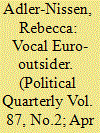

|
|
|
|
|
| Summary/Abstract |
The EU is divided between member states that have adopted the euro and those that have not. This article looks at the issue of differentiated integration with particular reference to eurozone integration and the euro-outsiders. I explore the recent public debate in the UK on euro-outsiderness, comparing this with debates in Denmark. The article highlights some striking differences between the UK and Denmark when it comes to the actual management of euro-outsiderness in Brussels as well as some of the dilemmas facing euro-outsiders such as the UK, Denmark, Sweden and Poland as the EU struggles to exit its crises. Finally, I discuss the future of two-speed European integration and the UK's possible exit from the EU. The UK cannot escape the dilemma of favouring either influence or autonomy; whether the UK remains in or leaves the EU, it will need to allow the eurozone to proceed in order to prevent further eurozone crises.
|
|
|
|
|
|
|
|
|
|
|
|
|
|
|
|
|
|
|
|
|